Hello Quartz readers,
Over the past five months, we’ve thrown a lot of information your way. Now we want to see how much you remember. In 13 questions, we’ll test your knowledge of coronavirus facts, figures, and trivia.
Pub quiz rules apply: Keep track of your answers, don’t Google stuff, and you’ll be able to check your work at the end of the email. It’s the opposite of face masks: The only person you hurt by cheating is yourself.
Okay, let’s get started.
Open your test booklets
1️⃣ While pandemics are almost impossible to fully contain, officials can mitigate the damage—to public health and the economy—if they can “flatten the curve” of infection. In this graphic representation of flattening the curve, what labels belong on the X and Y axes?
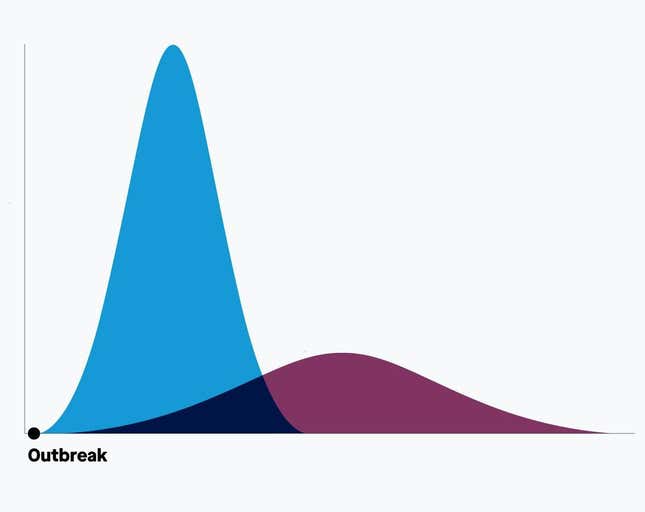
2️⃣ Back in March, MGM and Universal Pictures announced a last-minute delay in the release of a major blockbuster. It was a response to thousands of movie theater closures in China, and a harbinger of things to come. The latest in a longstanding franchise, the movie is now slated for a November debut. What film are we talking about?
3️⃣ As the world entered lockdowns and quarantines, what is “essential” became a matter of great debate. Depending on who you ask and where they live, the answers could differ drastically. See if you can match these countries with the product they considered critical:
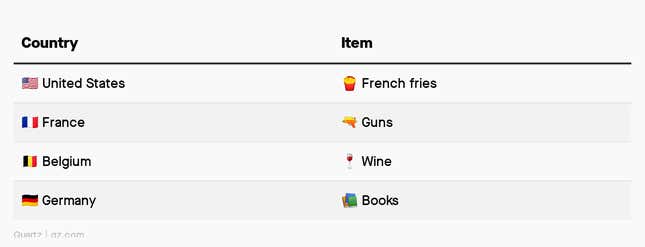
4️⃣ In May, Nintendo announced a 41% year-over-year increase in profit for the fiscal year ending in March, thanks in large part to the success of its Nintendo Switch game, Animal Crossing. While the game is largely devoted to quotidian tasks like interior decorating and neighborly socializing, it also boasts a bustling internal economy. In April, that economy got some big news. Was it:
- The discovery of a tarantula Ponzi scheme, resulting in millions of bells in losses.
- A sharp reduction by the Bank of Nook in the monthly interest rate on personal savings accounts.
- The ouster of three raccoons accused of offering subprime mortgages on new homes.
- A terrifying, unexplained “flash crash” in the turnip-based stalk market.
5️⃣ No retail outfit is a more perfect symbol of the pandemic than the humble grocery store. But once you get to these hallowed grounds, what should you buy? In April, we gathered 30,000 reader responses on items they valued more than usual in the pandemic. Which of these was the biggest winner?
- Gummy bears
- Sparkling water
- Tomatoes
- Boxed wine
6️⃣ Coronavirus comes with a data deluge. Everywhere we look, there are statistics to consider, making it more important than ever to understand their strengths and weaknesses. Quartz data editor Dan Kopf suggests using three key concepts to interpret pandemic facts and figures. What are they?
- Mean, median, and mode
- Bias, variability, and lag
- Liberté, égalité, fraternité
- Lather, rinse, repeat
7️⃣ So far this year, 21 public and private retailers in the US have filed for Chapter 11, more than in all of 2019. Which of these retailers did not file for bankruptcy in 2020?
- Neiman Marcus
- California Pizza Kitchen
- Brooks Brothers
- Muji
- Ann Taylor
- Pier 1 Imports
- Modell’s Sporting Goods
- True Religion
- JCPenney
8️⃣ Since it went online in 2000, the Oxford English Dictionary has only allowed updates on a strict quarterly basis. But in April, its lexicographers made an exception for Covid-19, adding that word as well as 20 new or updated coronavirus-related entries and sub-entries. Which of these words or phrases was included in that addition?
- Zoombombing
- Coronetiquette
- Revenge spending
- Elbow bump
9️⃣ A German program known as Kurzarbeit, which has existed for more than a century and gained international attention during the 2008 financial crisis, became particularly relevant during the pandemic—in part as a model for other nations. What does Kurzarbeit entail?
- Helping employers reduce employees’ working hours rather than laying them off.
- Providing universal basic income to everyone in Germany.
- Guaranteeing housing for low-income workers.
- Offering a loan payment holiday to everyone who buys a Mercedes.
🔟 In order to slow the spread of Covid-19, it’s necessary to understand exactly how the immune system tackles the disease. Fortunately, scientists have the basics of the immune system down pat. See if you can fill in these blanks:
With any new viral infection, the body first deploys ______ cells, which find and kill infected cells. Those fast-acting cells are in limited supply; if there’s still an infection after they’re depleted, the body will unleash a ______ to make the environment uninhabitable for the virus. After about a week, the adaptive immune system kicks in, using B cells to make ______ that can flag sick cells for annihilation even faster, and will stick around after an infection is over.
Who charted?
1️⃣ What are we charting here?
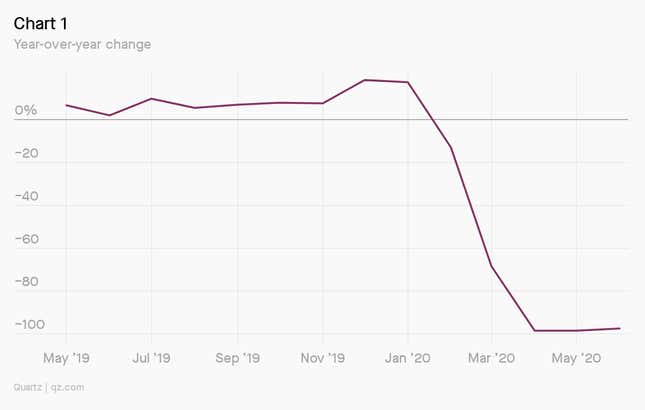
- Spending on clothing in Japan
- Travel spending in Europe
- Spending at restaurants in the US
2️⃣ What are we charting here?
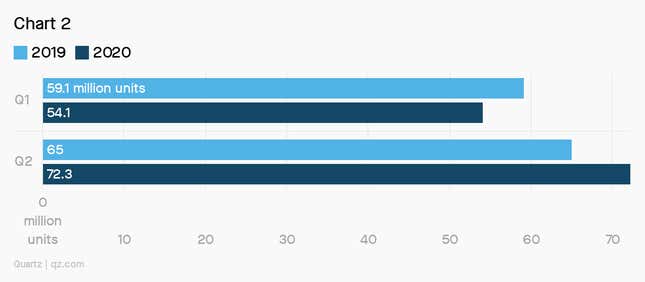
- Global computer sales
- Global truck sales
- Global bicycle sales
3️⃣ What are we charting here?
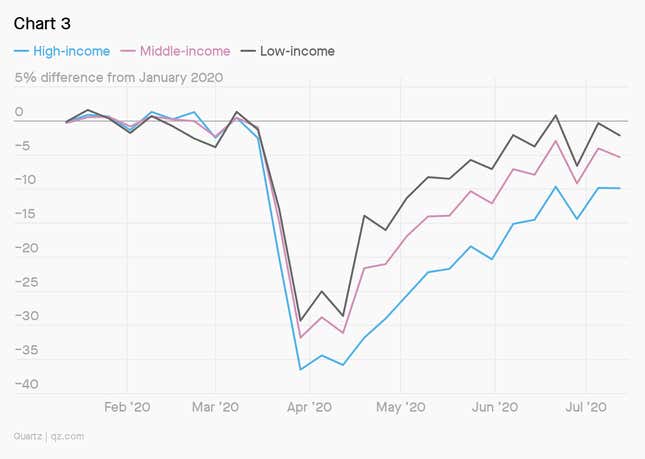
- Time spent outside the US by income group
- Unemployment rate in the US by income group
- Consumer spending in the US by income group
Answer 🔑
Award yourself one point for every correct answer. (Yes, it has to be the whole answer.)
Round 1:
- On the flattening-the-curve graphic, the X axis shows time since outbreak, and the Y axis shows the number of cases. The blue curve illustrates the potential case count if no preventative measures are taken; the purple curve shows the case count with a strong public-health response.
- No Time to Die, the latest in the James Bond franchise, is now slated for release on Nov. 20. The movie was set to lose $250 million if it debuted in April as planned.
- The US: 🔫 / France: 🍷 / Belgium: 🍟 / Germany: 📚 (though it’s worth noting that France and Belgium also made bookstores essential).
- (2) The Bank of Nook reduced monthly interest rates on savings accounts from 0.5% to 0.05% to lower the return on a game hack in which players would deposit bells, the game’s internal currency, then reset the time on the Switch to a future date to reap the rewards of compound interest.
- (4) Boxed wine. Vodka also outperformed its normal-times score, while beer and whiskey were rated lower under the pandemic conditions. In the US, canned cocktails are also having a moment.
- (2) Bias, variability, and lag. Statistical bias is the idea that a figure may be skewed up or down because one group is disproportionately likely to be part of a study. Many statistics are calculated using a randomly selected share of the population—variability can tell us whether that sample size is precise and representative enough. And lag refers to the sometimes lengthy process involved in collecting and releasing data.
- Trick question—they all did.
- (4) Elbow bump. The OED also added “flatten the curve,” “infodemic,” “self-isolate,” “social distancing,” and “WFH,” among other words.
- (1) Helping employers reduce their employees’ working hours rather than laying them off. A significant portion of the Covid-19 stimulus programs implemented in Europe involve some version of short-term work.
- Blank 1: T cells / Blank 2: fever / Blank 3: antibodies / (This comes from our edition on immunity which, let’s not forget, included a fantastic comic strip.)
Round 2:
- (2) Travel spending in Europe. Because of health concerns and related travel restrictions, tourist spending in Europe was down about 99% in April and May compared to last year.
- (1) Global computer sales, which shot up by 11% in the second quarter compared to the same quarter last year. In a normal year, computer sales don’t swing by more than 5% to 7%.
- (3) Consumer spending in the US by income group. After falling by more than 25% in late March and April, weekly purchases by poor Americans in July almost rebounded to January levels. By contrast, high-income spending is still well below typical levels.
Making the grade
Okay, be real with us (and yourself)—how did you do?
Would you be interested in more quizzes like this one?
🙄 No, you people need a hobby.
Essential reading
- The latest 🌏 figures: 17.3 million confirmed cases; 10.2 million classified as “recovered.”
- Inhospitable: Covid-19 is putting 85 million tourism jobs in India at risk.
- Coolcoolcool: Trump is making home loans riskier during a house crisis.
- Setting the stage: Universal’s deal with AMC is huge for the movie industry.
- Mitigated risk: African countries are reluctant to take up Covid-19 debt relief.
- On-the-job waning: Demand is even cooling for the “sexiest job of the century.”
Our best wishes for a healthy day. Get in touch with us at reply@qz.com, and live your best Quartz life by downloading our app and becoming a member. Today’s newsletter was brought to you by John Detrixhe, Dan Kopf, and Kira Bindrim.